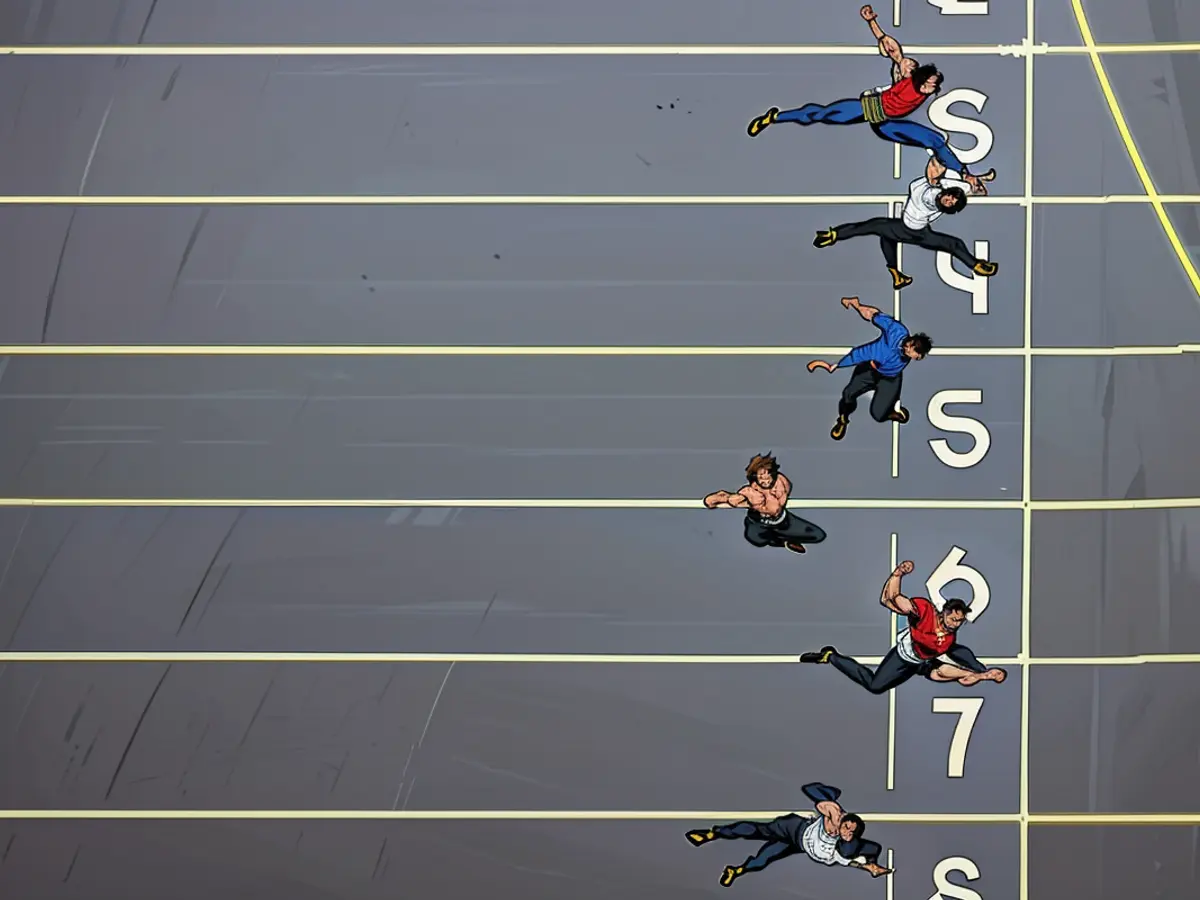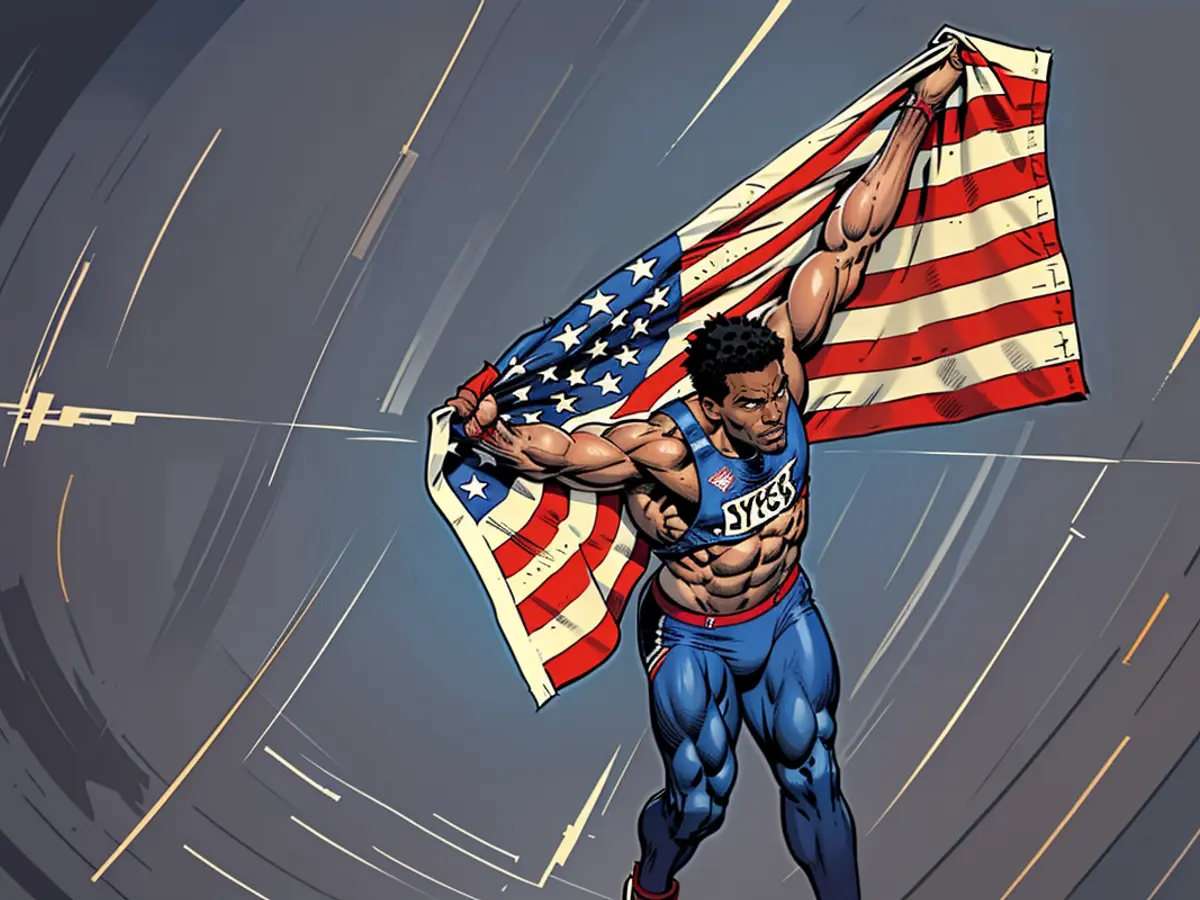The closest decision that the Olympics ever made.
The 100-meter sprint is the main event at the Olympic Games. No other competition garners as much global attention as the duel of the fastest men. And in Paris, the protagonists do not disappoint - quite the contrary.
The staging is dramatic. Suddenly, it becomes dark in the crackling Stade de France, and suddenly, only small, swaying lights on the spectator stands provide a little light. Then, a laser and tech show breaks out. The DJ makes the giant stadium tremble. It's the last minutes before the start of the 100 meters. The fastest man in the world is being sought. The successor to Olympic sensation Marcell Jacobs from Italy is being sought. The defending champion is there, but he has barely made it to the final. He is not a candidate for gold, for another surprise. But who is the favorite?
Noah Lyles, the world champion? Of course. Andre De Grasse, the fastest man of the year? Definitely. Fred Kerley, the man who is lightning-fast over 100, 200, and 400 meters? Always. The list goes on. But, small spoiler, the three mentioned win the medals. In the listed order. But what a drama this final is! Thompson and Kerley get off to a good start, Lyles doesn't. He is clearly behind the medal contenders for half of the race. Thompson is on course for gold, but then Lyles starts to fly. He runs past one after the other until he crosses the finish line simultaneously with Jamaican Thompson.
Who is it now? No one knows. Everyone stares at the scoreboard. Lyles suspects he might not be it. It takes 28 seconds for the result to come. "I went to Kishane and said, 'I want to be honest, brother, I think you won.' I was prepared for his name to appear, and when I saw my name, I thought, 'Wow, that's incredible. I'm incredible. That's what I wanted, this hard fight against incredible opponents. I'm the wolf among the wolves.' And perhaps the chosen one to become the new face of athletics. The role is vacant without Usain Bolt. Sure, there's pole vault world record holder Mondo Duplantis, there's hurdles star Karsten Warholm, and the provocative Jakob Ingebrigtsen. But a sprinter is a sprinter. The king of all. Always a 'natural born star.' Lyles has charm, courage, a love for quips, fast legs, and a story that Americans love: poor, precarious circumstances, learning difficulties, a victim of bullying, depression, and becoming a hero. With four golds?
Primal scream, superball, anger
Lyles is a showman, a bigmouth, a highly sensitive soul. He makes no secret of his feelings, his struggle with depression. Even before the final, he talks to his therapist. "She said, 'You have to let go, you have to let it flow.' And I said, 'Okay, I'll trust you.'"
The tension before the start is immense. For instance, the American Kenneth Bednarek runs too fast out of the tunnel during the presentation. He is called back. He doesn't like that. With an annoyed look, he eventually comes out again. It's a grand spectacle, the protagonists use the stage for themselves. Sometimes, it seems more important to make a show than to win a medal. Thompson lets out a thunderous roar, Lyles sprints like a lion, runs almost half the track, jumps wildly. As cool as the men want to be, they are incredibly nervous. They are in the spotlight of the global audience, like racehorses just waiting to be released. But it's not that simple. The preparation drags on, long, very long. Lyles expresses his displeasure with gestures, the colleagues are also not happy about the long waiting time.
Then the shot, then the sprint, then the drama. In the end, there are two 9.79 seconds, a super time. But there are not two golds. Five thousandths of a second make the difference. That's much less than a human blink. In the history of the Olympics, there has never been a closer decision. After 20 years, the sprint nation USA is back on top, where it always and forever wants to be. But it didn't find a place there for a long time because Jamaica, because Bolt dominated. Now Lyles has delivered. He has delivered what he promised. Already at the opening ceremony, he streamed from the boat on the Seine and greeted as "the fastest man in the world". He put himself under pressure. And he wants more. He will also win gold over the 200 meters "to 100 percent". "When I come out of the curve, they will get depressed," he said. Meanwhile, the third, Fred Kerley, the man without a smile, had long since joked to him: "Are you talking shit, man?"
The drama of Tokyo changed him. Probably not. Already last year, when he won three gold medals at the World Championships, he announced that a new dynasty was beginning. Before his triumph last year at the home World Championships, he had once again come from a very deep valley. It was a story that the Americans love so much. A hero with a heavy break in his resume. In the past two years (and a few months), a lot has happened to him, too much: first the pandemic, then the postponement of the Olympic Games in Tokyo, and finally the Black Lives Matter movement. It went beyond the limits of endurance, and beyond. The sensitive sprinter struggled more with himself than with his competitors.
In the summer of 2024, Lyles will be forgotten, he is at the top and wants to stay there. He has made peace with the games. Three years ago in Tokyo, he suffered from the ghostly corona atmosphere. He needs the stage, the loudness, the push. Over his showcase distance, the 200 meters, he only won bronze. "That's not enough," Lyles swore afterwards. The depression came back. He focused even more, worked even harder, always looking for new ways to improve even more.
Now the impressive resurrection. He is the star of a Netflix series, a advertising figure. Rapper Snoop Dogg came to watch the Olympic final. "The more eyes on me, the better I am," said the 27-year-old - and then he actually kept his word.
The Olympic Games are not just about athletic prowess but also the drama and drama they bring. In Paris, the 100-meter final was no exception, with Noah Lyles delivering an unexpected victory, becoming the new face of athletics following in the footsteps of Usain Bolt.
During the final, Lyles, known for his showmanship and charisma, expressed his feelings and struggles, showcasing his emotional side to the global audience.









